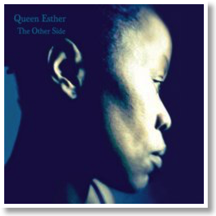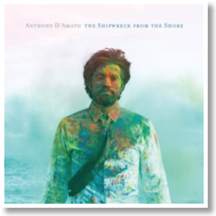September 2014
Queen Esther

The Other Side
EL Recordings
Performer, vocalist, musician, songwriter, and actor Queen Esther is best known for her theater work and jazz excursions, but here her versatility and eclecticism is demonstrated through her love of gospel, classical music, opera, show tunes, and country music.
The Other Side’s album cover displays a Billie Holiday-style set against a jazz-blues background with African decorations, but the album tracks counteract this notion; each of the 13 songs is steeped in country and folk music traditions, which is more reminiscent of artists such as Charley Pride and Odetta.
“Sunnyland,” the opening track, mines heartland rock spirit (Bruce Springsteen, Tom Pettty), soul-blues vocal styling and the drive of Southern tones. Antique folk and early country permeates “I’ve Come Undone Again,” but with the unusual addition of violin and drums. A sparse but country pop-feel of “Oh Sun” fits snugly with the countrypolitan sound of the late ‘50s and early ‘60s (Skeeter Davis, Eddy Arnold). But there is more than towering old-time musical influences. She tackles the rock outfit Steve Miller Band’s perennial “Jet Airliner,” belting her way through a deep groove. Once-rockabilly singer Wanda Jackson’s “My Big Iron Skillet” is given a fine impression, and Charlie Rich’s “I Feel Like Going Home” is imbued in gospel touches.
The album track reads like a spiritual poem with Christian references abounding (“When the Lord carries me home”), hearkening to the country-gospel hymns of The Carter Family and The Oak Ridge Boys. Exceptional songwriting is found in “Love Is a Wrecking Ball,” which creatively assays the irrationality of love with contrasting images (“Love is an ocean in my teacup so sublime/Love is a funhouse ride that scares me all the time”). “Sadness Everlasting” focuses on failed optimism by way of repeated mistakes: “You’re the victim/Victimizing/Constantly antagonizing…You kiss your love and feel sorrow ever flowing…You get back up on your high horse and walk away.”
The Other Side serves its purpose: showcasing an acclaimed performer who gives a subtle message to not judge an album by its cover. There is a lot of meat here, even if the tracks alternate between earlier country music and plaintive folk sounds. Hints of jazz, blues, and gospel bubble about, and the drive and energy in some of the tracks take cues from rock music. Sophistication and authenticity work in tandem to deliver a record that on the surface may seem simple but in reality has a mark of different inspired musical textures that work together.
by Jeff Boyce
Anthony D’Amato

The Shipwreck From The Shore
New West Records
Fans of folk music are in for a treat this summer with the release of Anthony D’Amato’s new album, The Shipwreck From The Shore. A 26 year-old Princeton graduate, D’Amato writes with a sense of youthful buoyancy. His vocal style is reminiscent of Ben Kweller or Ben Folds, two contemporary giants in the folk scene. The simple melodies combined with the soothing quality of D’Amato’s voice make for a pleasant listening experience.
Even the more unsettling songs have a lightness about them. “Good And Ready” is based around the lyrics, “I don’t want to wake up / If it ain’t next to you.” It is a sweet sentiment, but one of the first lines of the song is, “Let me die in my sleep / When I’m good and ready.” Ordinarily this kind of language would elicit a dark emotional response. However, the song’s steady, upbeat feel puts the audience at ease. Standard harmonies give the song a sense of familiarity and groundedness, further diverting the listener’s attention from the weight of the text.
Though the album largely conforms to the “folk mold,” D’Amato shows more originality in his song “Ludlow.” The piece begins with a brief introduction featuring a duet for clarinet and acoustic guitar. The clarinet sings a sweet, meandering melody reminiscent of a movie score.
The lyrics depart from the more formulaic texts in the album. After the clarinet and guitar do their dance, D’Amato comes in with, “First the whisper, then the shout / First the temple, then the doubt.” This piece brings a unique poetic element, which is lacking in the other songs.
“Ludlow” does not deviate from D’Amato’s typical peaceful ambiance. However, the song possesses a more deliberate intention than many of the other songs. The vocals interact beautifully with the instruments, particularly with the clarinet. The hollow quality of the instrument mirrors and heightens the effect of D’Amato’s voice, jointly and effectively conveying a compelling message.
by Jacqueline Perrin
Seun Kuti

A Long Way To the Beginning
Knitting Factory Records
Seun Kuti (Oluseun Anikulapo Kuti), the youngest son of Afrobeat pioneer and innovator Fela Kuti, has released A Long Way To the Beginning with some members of his father's legendary band, Egypt 80. Steeped in rhythm & blues saxophones, Afro jazz-funk rhythms, and vibrancy associated with spiritual uplift and robust messages, Kuti sustains his father’s tales and philosophies of corrupt leaders, suffering nations, and the need to maintain freedom, self-determination, and peace.
“IMF” centers on ire against the International Monetary Fund, comparing the World Bank to his father’s inflammatory “ITT” (International Thief Thief), except it draws in rapped verses from hip-hop duo Dead Prez’ M1. “African Airways” builds upon the African sing along traditions, complex grooves, and jazz solos, contrasted with thought-provoking commentary against neo-colonialism. “Ohun Aiye,” sung in the Nigerian-Congolese language known as Yoruba, slows to a mid-tempo reggae beat, pulling from a film about a man unable to leave Nigeria once the opportunity presents itself. The honking saxophone-led “Kalakuta Boy” meshes Caribbean and African punctuations into a cohesive narrative about his father’s notorious communal compound that the Nigerian government had raided in the 1970s, an inspiration to his work: “I get knowledge ‘cause a great man raised me/I show no fear ‘cause the great man trained me.”
Mined by expansive grooves, jazz improvisation, and lyrical clout, Seun Kuti creates a striking manifesto that aims to reach the global audience. Themes of affliction, animosity, and anti-corruption abound, calling for change in celebratory grooves that are equally potent. A Long Way To the Beginning is a masterwork in Afrobeat music.
by Jeff Boyce


